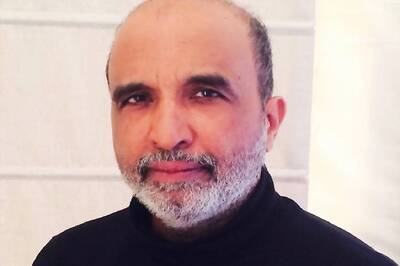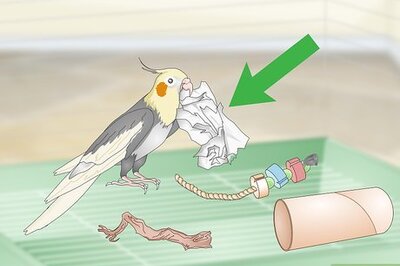
views
London: Britain's tabloid phone-hacking scandal enveloped the London police force on Monday with the rapid-fire resignations of two top officers and claims of possible illegal eavesdropping, bribery and collusion. UK officials immediately vowed to investigate.
Prime Minister David Cameron, feeling the political heat from his own close ties to individuals within Rupert Murdoch's media empire, cut short his trip to Africa and called an emergency session of Parliament for Wednesday so he could address lawmakers on the scandal.
UK lawmakers on Tuesday will grill Murdoch, his son James and Rebekah Brooks, the ousted chief executive of Murdoch's UK newspaper arm, in a widely anticipated televised public hearing on the scandal. Lawmakers hope to learn more about the scale of phone hacking by UK journalists and who - if anyone - in Murdoch's empire was aware of what allegedly took place at the now-defunct News of the World tabloid.
One of the first voices to blow the whistle on the phone hacking - former News of the World journalist Sean Hoare - was found dead Monday in Watford, about 25 miles (40 kilometers) northwest of London. Police said the death was being treated as unexplained but was not considered suspicious, according to Britain's Press Association.
Hoare was quoted by The New York Times saying that phone hacking - listening to the voice mail of celebrities, politicians, other journalists or even murder victims - was widely used and even encouraged at the News of the World under then-editor Andy Coulson.
Coulson - who most recently served as Prime Minister David Cameron's communications chief - was arrested as part of the widening investigation into phone hacking and police corruption.
The crisis has also triggered upheaval in the upper ranks of Britain's police. Monday's resignation of Assistant Commissioner John Yates - Scotland Yard's top anti-terrorist officer - followed that Sunday of police chief Paul Stephenson - both for links to an arrested former executive from Murdoch's shuttered News of the World tabloid.
The scandal over Murdoch journalists hacking into cell phones for scoops and paying police for information has knocked billions off the value of Murdoch's News Corp. The media baron was already forced to shut down the 168-year-old News of the World tabloid, accept the resignations of top deputies in Britain and in the US and abandon his dream of taking full control of a lucrative satellite broadcaster, British Sky Broadcasting.
Britain's police watchdog on Monday said it had received allegations of potential wrongdoing in connection with phone hacking against four senior officers - Stephenson, Yates and two former senior officers. One of the claims is that Yates inappropriately helped get a job for the daughter of former News of the World editor, Neil Wallis, one of 10 people arrested in the scandal.
The Independent Police Complaints Commission said it was looking into the claims.
Yates insisted he had done nothing wrong. "I have acted with complete integrity," he said. "My conscience is clear."
But the government quickly announced an inquiry into police-media relations and corruption.
"Who polices the police?" asked Home Secretary Theresa May as she announced an inquiry into "instances of undue influence, inappropriate contractual arrangements and other abuses of power in police relationships with the media and other parties."
London's police force is also under intense pressure to explain why its original hacking investigation failed to find evidence to prosecute anyone other than a single reporter and a private investigator.
Yates was the official who decided two years ago not to reopen police inquiries into phone hacking and police bribery by tabloid journalists, saying he did not believe there was any new evidence to consider.
Detectives reopened the investigation earlier this year and now say they have the names of 3,700 potential hacking targets - celebrities, politicians, other journalists and even murder victims.
Cameron is under heavy pressure after the resignations of Stephenson and Yates, and Sunday's arrest of Brooks - a friend and neighbor whom he has met with at least six times since entering office 14 months ago.
Brooks was arrested on suspicion of hacking into the cell phones of people in the news and bribing police for information to fuel sensational scoops for her gossipy tabloids.
Cameron's critics grew louder in London as the prime minister visited South Africa on a two-day visit to the continent. The trip was already cut in half by the crisis and Cameron trimmed another seven hours from his itinerary as his government faced growing questions about its cozy relationship with the Murdoch empire.
Parliament was to break for the summer but Cameron demanded that lawmakers reconvene Wednesday "so I can make a further statement."
Cameron insisted his Conservative-led government had "taken very decisive action" by setting up a judge-led inquiry into the wrongdoing at the now-defunct Murdoch tabloid News of the World and into the overall relations between British politicians, the media and police.
"We have helped to ensure a large and properly resourced police investigation that can get to the bottom of what happened, and wrongdoing, and we have pretty much demonstrated complete transparency in terms of media contact," Cameron said.
But opposition leader Ed Miliband said Cameron needed to answer "a whole series of questions" about his relationships with Brooks, James Murdoch and Coulson, the former News of the World editor whom Cameron later hired as his communications chief. Coulson resigned from that post in January was arrested earlier this month in the scandal.
"At the moment, he seems unable to provide the leadership the country needs," Miliband said of Cameron.
At Tuesday's televised hearing, politicians will seek more details from the two Murdochs and Brooks about the scale of criminality at the News of the World. The Murdochs will try to avoid incriminating themselves or doing more harm to their business without misleading Parliament, which is a crime.
The showdown comes as James Murdoch - chairman of BSkyB and chief executive of his father's European and Asian operations - appears increasingly isolated following the departure of Brooks.
James Murdoch did not directly oversee the News of the World, but he approved payments to some of the paper's most prominent hacking victims, including 700,000 pounds ($1.1 million) to Professional Footballers' Association chief Gordon Taylor. That could make him a possible candidate for arrest or resignation.
James Murdoch said last week that he "did not have a complete picture" when he approved the payouts.
Murdoch is eager to stop the crisis from spreading to the United States, where many of his most lucrative assets - including the Fox TV network, 20th Century Fox film studio, The Wall Street Journal and the New York Post - are based.
News Corp. on Monday appointed lawyer Anthony Grabiner to run its Management and Standards Committee, which will deal with the phone hacking scandal. It said the committee will cooperate with all investigations on hacking and alleged police payments, and carry out its own inquiries.
In New York, News Corp.'s widely traded Class A shares fell 69 cents, or 4.4 percent, to $14.96 in early afternoon trading on Monday. The shares are down 15.5 percent since the end of June.
Judd Legum, a media expert at the Washington-based Center for American Progress, said there was "potential liability" in the U.S. for News Corp., which could face substantial fines if found to have violated the U.S. Foreign Corrupt Practices Act. He said the Justice Department had been aggressively pursuing such cases.
"Even if it happens abroad, under U.S. law you can't bribe foreign officials for business," said Legum, noting that investigators would have to determine whether top executives were "directly involved" in bribery if individual prosecutions were to proceed.
Stephenson, the London police chief, resigned Sunday over his ties to Wallis, who has been arrested in the scandal and was employed as a part time PR consultant to the force for a year until September. He said he had nothing to do with the earlier phone hacking inquiry or with Wallis, but was resigning to allow his agency to focus on the London 2012 Olympics instead of leadership changes.
Yates, also accused of links to Wallis, resigned after being told he would be suspended pending an ethics investigation. Yates will be replaced by Assistant Commissioner Cressida Dick on an interim basis.
At an 2003 appearance before U.K. lawmakers, Brooks admitted that News International had paid police for information. But she has always said she did not know any phone hacking was going on when she was editor of the News of the World between 2000 and 2003 - a claim many find hard to believe.
It was under Brooks' watch that News of the World journalists accessed the phone of slain teenager Milly Dowler in 2002 while police were looking for the missing 13-year-old - a revelation that has fueled outrage in Britain.
Brooks was detained and questioned for nine hours Sunday before being released on bail. Her lawyer, Stephen Parkinson, released a defiant statement Monday professing her innocence, and saying that police would "have to give an account of their actions" considering "the enormous reputational damage" the arrest had caused her.
Police have arrested 10 people in all, including other former News of the World reporters and editors, but on Monday cleared one of them, Press Association royal reporter Laura Elston. No one has been charged in the investigations.




















Comments
0 comment